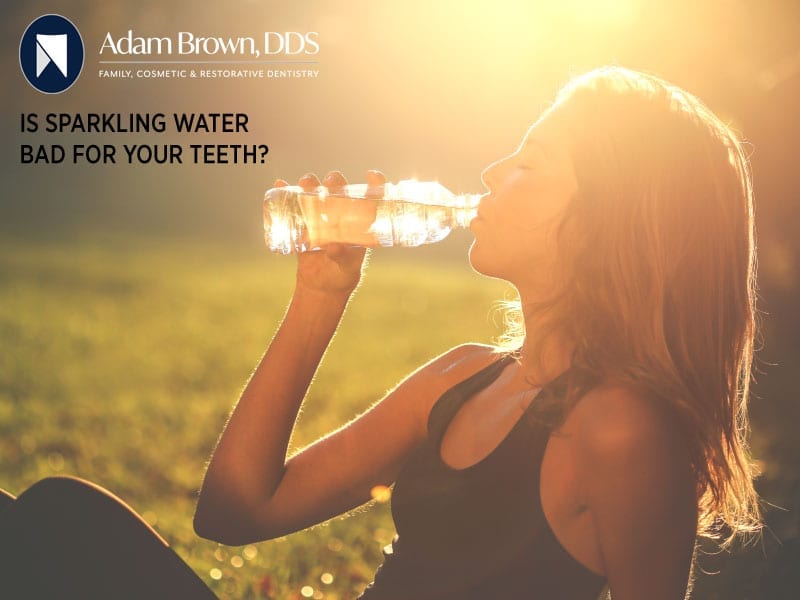There has been a lot of buzz lately about sparkling water, with many people touting it as an alternative to regular or diet sodas. Also, with the many flavorings out there now, sparkling and seltzer waters have become far more attractive as a choice for a soft drink. In fact, sales of sparkling water have doubled since 2011. That said, some have questioned whether sparkling water is bad for your teeth and, if so, how?

It is important to understand the impact of the trend in sparkling water consumption and its impact on your teeth. We want to delve into this controversy, clear up some misconceptions, and give you a few pointers so you can continue to take care of your oral health.
Firstly, it is important to understand that carbonated water has CO2 in it, which gives the bubbly effervescence to carbonated water. But when you drink the fizzy carbonated water, a chemical reaction transpires in your mouth, which turns the Co2 into carbonic acid. But know this: this is a relatively weak acid on its own, so unless you choose sparkling or seltzer waters flavored with citrus (and thus a more acidic sparkling water), the acidic levels are quite low.
In 2016 the Journal of the American Dental Association (JADA) released a study of the acidity of various beverages. As a baseline, spring water was used (it has a neutral acidity level of pH 7.4) to assess the acidity of sparkling waters. Sparkling water was found to have an average of pH 5 or 5.5 (for example, Perrier is 5.5), making them definitely acidic in nature. The ADA concluded that, on the whole, sparkling water exceeds the acidity of regular tap or spring water. Thus, our attitudes toward sparkling water need to be adjusted slightly, for sparkling water is not the same as any old, regular water.
However, the ADA has not found conclusive evidence of any kind that suggests drinking sparkling water is harmful to your tooth enamel. In fact, the acidity level of coffee is far higher, and thus worse, for your teeth than is sparkling water. Compare coffee’s pH level of up to 6 (depending on the coffee), in contrast to sparkling water’s pH 5 level, and you can see that coffee is a bigger culprit in tooth enamel’s loss.
Helpful Strategies
- Don’t sip sparkling waters throughout the day, like you would spring or tap water. Rather, drink them in one sitting (in a short span of time), in order to decrease the length of exposure of your tooth enamel to the acidity levels.
- If you have dry mouth, which is decreased salivation production due to other illnesses like diabetes, it is best to avoid acidic drinks of any kind.
- Brush your teeth after consuming these drinks (and coffee, too, for that matter!). So many of us tend to think we should only brush after eating, forgetting that sugary or acidic elements in drinks we imbibe can be just as harmful to our oral health. So, carry a small toothbrush and toothpaste tube with you to take on the go, and brush after both eating and drinking anything (other than plain water).
- Use a mouthwash twice a day, morning and evening. If you are a real enthusiast, you can certainly take a swish-and-spit moment after lunch, following a good tooth brushing. Mouthwash can clear away bacteria and harmful sugars from your teeth. Remember, acidity breaks down tooth enamel and then it is the bacteria, feeding on sugar in your mouth, that creates the problem. Mouthwash can eliminate the bacteria and wash away the sugar—this will preserve your tooth enamel as well.
On the whole, choosing seltzers and sparkling waters is a far better choice for your teeth than drinking regular or diet sodas. The pH levels of most seltzers and sparkling waters are better for your teeth than the average soda. However, from a basic health standpoint (which will always be the best choice for your teeth), drink eight glasses of tap or spring water a day. Plain, pH neutral water is the best choice for your health at every level. And, if you are apt to drink seltzers or sparkling waters, a single swig of plain water after you finish the can, with a bit of a swish of that plain water about your mouth, can help to wash away some of the acidic build-up.
Have more questions? Talk to your oral hygienist or one of our dentists at Carolinas Dental Choice.
